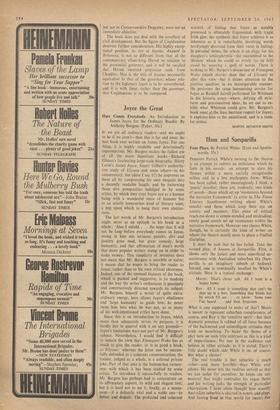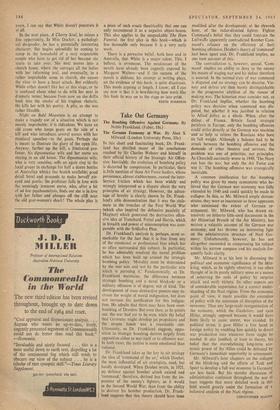Ham and Sarsparilla
PERHAPS Patrick White's turning to the theatre is an attempt to redress an imbalance which he feels in his novels: an attempt to state his themes within a more socially recognisable milieu and in a less mythopceic form. White has been called, rather meaninglessly I think, a 'poetic' novelist; there are, evidently, two kinds of novels—those which set up 'resonances beyond the narrative framework' (a critic in The Times Literary Supplement writing about White's novels)—and those which keep their eye on society and manners. This piece of critical reach-me-down is simple-minded and misleading; surely good novels set up resonances within the narrative framework. However one classes White, though, he is certainly the kind of writer on whom the theatre would seem to place a fruitful discipline.
It must be said that he has failed. Take the second play, A Season at Sarsparilla. First, it shows only the laziest and most superficial ac- quaintance with Australian suburban life (Sars- parilla is an imaginary suburb of Sydney). Second, one is continually insulted by White's attitude. Here is a typical exchange: MAvis: That's clever talk. All I want is a happy home.
Roy: All I want is something that can't be shut up in a box. Something that blinds but by which I'll see . . . or know. Some tune I've heard . . . and then forgotten . . .
What is one supposed to make of that? Mavis is meant to represent suburban complacency, of course, and Roy is the 'sensitive spirit'—but their dramatic presence is robbed of all force because of the hackneyed and unintelligent attitudes they keep on mouthing. To make the theme of a play turn on such trite contrasts as this is a kind of impertinence. No one in the audience can believe in either attitude, as it is stated. There's little doubt which side White is on, of course. But what a choice!
The real trouble is that suburbia is much richer—and more horrible—than White ever allows. He never lets the realities unfold so that we can judge for ourselves; he keeps out am/ material that might contradict his vague thesis and his writing lacks the strength of particular observation. I have often thought how scantily Australian suburbia is charted in novels and plays. And having lived in that world for twenty-five
years, I can say that White doesn't penetrate it at all.
In the next piece, A Cheery Soul, he misses a fine opportunity. In Miss Docker, a pathologi- cal do-gooder, he has a potentially interesting character. She begins splendidly by coming to camp in the household of a very respectable couple who have to get rid of her because she starts to take over. She next moves into a church home, where she outrages all the ladies with her reforming zeal, and eventually, in a rather improbable scene in church, she causes the vicar to have a heart attack. But evidently White either doesn't like her at this stage, or he is confused about what to do with her next in dramatic terms; because from now on she drifts back into the smoke of his tragiose rhetoric. He kills her with his poetry. A pity, as she was rather likeable.
Night on Bald Mountain is an attempt to make a tragedy out of a situation which is not merely improbable; it is ridiculous. We have an old crone who keeps goats on the side of a hill and who introduces several scenes with her maniacal speeches—to the goats. Perhaps she is meant to illustrate the glory of the open life. Anyway, farther up the hill, a frustrated pro- fessor, his dipsomaniac wife and her nurse are staying in an old house. The dipsomaniac wife, who is very sensitive, sells an agate ring to the local grocer in exchange for half a dozen bottles of Australian whisky (no Scotch available; good detail here) and proceeds to make herself pie- eyed and poetic; the professor falls in love with the seemingly innocent nurse, who, after a bit of ad hoc psychoanalysis, finds out she is in love with her father and plunges off the cliff near the old goat-woman's shack! The whole play is a piece of such ersatz theatricality that one can only recommend it as a negative object-lesson. This also applies to the unspeakable The Ham Funeral, the first play in this book—which is less damnable only because it is a very early work.
There is a pervasive belief, both here and in Australia, that White is a major talent. This, I believe, is erroneous. The weaknesses of the novels have already been cogently exposed by Margaret Walters—and if the success of the novels is dubious, his attempt at writing plays, on the evidence of this book, is quite disastrous. This needs arguing at length, I know; all I can say now is that it is bewildering how work like this finds its way on to the stage or into print.
KEITH HARRISON



































 Previous page
Previous page